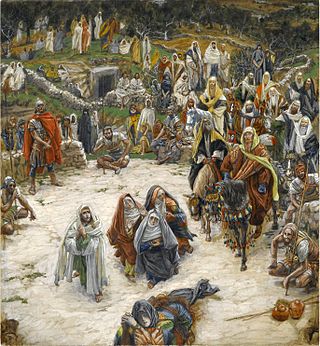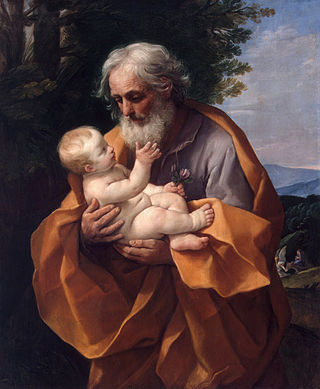Related Research Articles

In Islam, Jesus is believed to be the penultimate prophet and messenger of God and the Messiah sent to guide the Children of Israel with a book called the Injīl.
The Penitent Thief, also known as the Good Thief, Wise Thief, Grateful Thief, or Thief on the Cross, is one of two unnamed thieves in Luke's account of the crucifixion of Jesus in the New Testament. The Gospel of Luke describes him asking Jesus to "remember him" when Jesus comes into his kingdom. The other, as the impenitent thief, challenges Jesus to save himself and both of them to prove that he is the Messiah.
Christian anarchism is a Christian movement in political theology that claims anarchism is inherent in Christianity and the Gospels. It is grounded in the belief that there is only one source of authority to which Christians are ultimately answerable—the authority of God as embodied in the teachings of Jesus. It therefore rejects the idea that human governments have ultimate authority over human societies. Christian anarchists denounce the state, believing it is violent, deceitful and idolatrous.

Abraham Lincoln delivered his second inaugural address on Saturday, March 4, 1865, during his second inauguration as President of the United States. At a time when victory over secessionists in the American Civil War was within days and slavery in all of the U.S. was near an end, Lincoln did not speak of happiness, but of sadness. Some see this speech as a defense of his pragmatic approach to Reconstruction, in which he sought to avoid harsh treatment of the defeated rebels by reminding his listeners of how wrong both sides had been in imagining what lay before them when the war began four years earlier. Lincoln balanced that rejection of triumphalism, however, with recognition of the unmistakable evil of slavery. The address is inscribed, along with the Gettysburg Address, in the Lincoln Memorial.
Adherents of Judaism do not believe that Jesus of Nazareth was the Messiah nor do they believe he was the Son of God. In the Jewish perspective, it is believed that the way Christians see Jesus goes against monotheism, a belief in the absolute unity and singularity of God, which is central to Judaism; Judaism sees the worship of a person as a form of idolatry, which is forbidden. Therefore, considering Jesus divine, as “God the Son”, is forbidden. Judaism's rejection of Jesus as the Messiah is based on Jewish eschatology, which holds that the coming of the true Messiah will be associated with events that have not yet occurred, such as building the Third Temple, a Messianic Age of peace, and the ingathering of Jews to their homeland.
Nonresistance is "the practice or principle of not resisting authority, even when it is unjustly exercised". At its core is discouragement of, even opposition to, physical resistance to an enemy. It is considered as a form of principled nonviolence or pacifism which rejects all physical violence, whether exercised on individual, group, state or international levels. Practitioners of nonresistance may refuse to retaliate against an opponent or offer any form of self-defense. Nonresistance is often associated with particular religious groups, such as Anabaptist Christianity.

The sayings of Jesus on the cross are seven expressions biblically attributed to Jesus during his crucifixion. Traditionally, the brief sayings have been called "words".

Jesus, also referred to as Jesus Christ, Jesus of Nazareth, and many other names and titles, was a first-century Jewish preacher and religious leader. He is the central figure of Christianity, the world's largest religion. Most Christians believe Jesus to be the incarnation of God the Son and the awaited Jewish Messiah, or Christ, that is prophesied in the Old Testament.
There exists a consensus among scholars that the language of Jesus and his disciples was Aramaic. Aramaic was the common language of Judea in the first century AD. The villages of Nazareth and Capernaum in Galilee, where Jesus spent most of his time, were Aramaic-speaking communities. Jesus probably spoke a Galilean variant of the language, distinguishable from that of Jerusalem. Based on the symbolic renaming or nicknaming of some of his apostles it is also likely that Jesus or at least one of his apostles knew enough Koine Greek to converse with those not native to Judea. It is reasonable to assume that Jesus was well versed in Hebrew for religious purposes.

Matthew 1:25 is the twenty-fifth and final verse of the first chapter of the Gospel of Matthew in the New Testament. Joseph has awakened from a dream in which an angel gave him instructions about the birth of Jesus. He has taken Mary into his home, completing their marriage. In this verse, Jesus is born and his name is given to him by Joseph.
There are a number of passages in the Hebrew Bible and the New Testament that have been interpreted as involving same-sex sexual activity and relationships. The passages about homosexual individuals and sexual relations in the Hebrew Bible are found primarily in the Torah. The book of Leviticus chapter 20 is more comprehensive on matters of detestable sexual acts. Some texts included in the New Testament also reference homosexual individuals and sexual relations, such as the Gospel of Matthew, the Gospel of Luke, and Pauline epistles originally directed to the early Christian churches in Asia Minor. Both references in the Hebrew Bible and the New Testament have been interpreted as referring primarily to male homosexual individuals and sexual practices, though the term homosexual was never used as it was not coined until the 19th century.
Bible prophecy or biblical prophecy comprises the passages of the Bible that are claimed to reflect communications from God to humans through prophets. Christians usually consider the biblical prophets to have received revelations from God.

John 8 is the eighth chapter in the Gospel of John in the New Testament of the Christian Bible. It continues the account of Jesus' debate with the Pharisees after the Feast of Tabernacles, which began in the previous chapter.

The Parable of the Weeds or Tares is a parable of Jesus which appears in Matthew 13:24–43. The parable relates how servants eager to pull up weeds were warned that in so doing they would root out the wheat as well and were told to let both grow together until the harvest. Later in Matthew, the weeds are identified with "the children of the evil one", the wheat with "the children of the Kingdom", and the harvest with "the end of the age". A shorter, compressed version of the parable is found without any interpretation in the apocryphal Gospel of Thomas.
The text and rubrics of the Roman Canon have undergone revisions over the centuries, while the canon itself has retained its essential form as arranged no later than the 7th century. The rubrics, as is customary in similar liturgical books, indicate the manner in which to carry out the celebration.

In Christian theology, Hell is the place or state into which, by God's definitive judgment, unrepentant sinners pass in the general judgment, or, as some Christians believe, immediately after death. Its character is inferred from teaching in the biblical texts, some of which, interpreted literally, have given rise to the popular idea of Hell. Theologians today generally see Hell as the logical consequence of rejecting union with God and with God's justice and mercy.
The books of the New Testament frequently cite Jewish scripture to support the claim of the Early Christians that Jesus was the promised Jewish Messiah. Scholars have observed that few of these citations are actual predictions in context; the majority of these quotations and references are taken from the prophetic Book of Isaiah, but they range over the entire corpus of Jewish writings.
In Mormonism, revelation is communication from God to man. Latter Day Saints teach that the Latter Day Saint movement began with a revelation from God, which began a process of restoring the gospel of Jesus Christ to the earth. Latter Day Saints also teach that revelation is the foundation of the church established by Jesus Christ and that it remains an essential element of his true church today. Continuous revelation provides individual Latter Day Saints with a "testimony", described by Richard Bushman as "one of the most potent words in the Mormon lexicon".
Imprecatory Psalms, contained within the Book of Psalms of the Hebrew Bible, are those that imprecate – invoke judgment, calamity or curses upon one's enemies or those perceived as the enemies of God. Major imprecatory Psalms include Psalm 69 and Psalm 109, while Psalms 5, 6, 11, 12, 35, 37, 40, 52, 54, 56, 57, 58, 59, 79, 83, 94, 137, 139 and 143 are also considered imprecatory. As an example, Psalm 69:24 states toward God, "Pour out Your indignation on them, and let Your burning anger overtake them."
Prophets in Islam are individuals in Islam who are believed to spread God's message on Earth and serve as models of ideal human behaviour. Some prophets are categorized as messengers, those who transmit divine revelation, most of them through the interaction of an angel. Muslims believe that many prophets existed, including many not mentioned in the Quran. The Quran states: "And for every community there is a messenger." Belief in the Islamic prophets is one of the six articles of the Islamic faith.